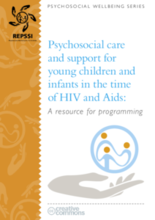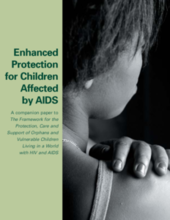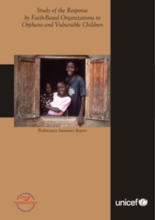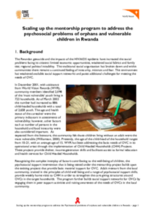Displaying 841 - 850 of 911
A regional assessment of responses to children outside parental care in the Caribbean. Extensive research on successful examples of alternative care. Includes recommendations and lessons learned.
Examines how a rights-based approach can provide a firm foundation for framing priorities and responses to children and families affected by HIV/AIDS.
Clear programme guidance on psychosocial support, with a special focus on infants and young children. Excellent explanation of psychosocial support models.
Outlines how to strengthen social protection, legal protection, and alternative care for children at country level. Contains specific actions that governments and NGO's can take to decrease the vulnerability of children affected by AIDS and respond to instances of abuse, exploitation and neglect.
This document contains a bibliography global conditional cash transfer documents.
A study that looks at the response of faith-based organizations in Kenya, Malawi, Mozambique, Namibia, Swaziland, and Uganda. The report contains statistical information, and details positive care practices to build on, and negative examples to avoid.
A set of standards for agencies that provide child care/day care services within the family home e.g. nannies, child minders, and babysitters.
This report captures the discussions and activities from a workshop held in Kathmandu, Nepal on 17-19 October 2005 on engaging men as caregivers. The report presents a background and rationale, the expectations and objectives of the workshop, and an overview of work being done to engage fathers both in the region as well as globally.
Outlines the results of World Vision Rwanda’s mentorship program for children in child-headed households and other OVC. Includes challenges and lessons learned.
A tool to encourage donors to fund community programs that keep children in family care, rather than simply funding orphanages. Describes the many strategies being used to invest in community-based care, and contains specific program examples.










